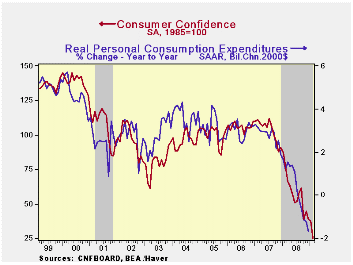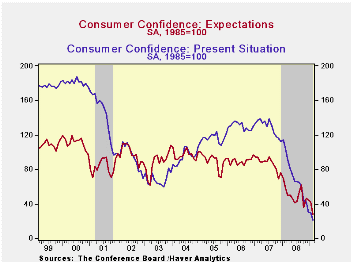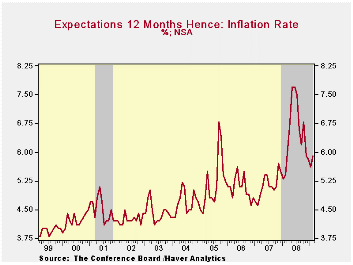 Global| Feb 24 2009
Global| Feb 24 2009U.S. Consumer Confidence Fell To A Record Low
by:Tom Moeller
|in:Economy in Brief
Summary
The Conference Board reported that its February index of consumer confidence fell to another record low. The decline to a reading of 25.0 was a one-third drop versus January and it lowered confidence by three-quarters from the July [...]
 The
Conference Board reported that its February index of consumer
confidence fell to another record low. The decline to a
reading of 25.0 was a one-third drop versus January and it lowered
confidence by three-quarters from the July 2007 peak. The
February decline was much deeper than Consensus expectations.
The
Conference Board reported that its February index of consumer
confidence fell to another record low. The decline to a
reading of 25.0 was a one-third drop versus January and it lowered
confidence by three-quarters from the July 2007 peak. The
February decline was much deeper than Consensus expectations.
The Conference Board data can be found in Haver's CBDB database.
During the last ten years there has been an 83% correlation between the level of consumer confidence and the y/y change in real consumer spending.
The present conditions index fell 28.6% from the
January level and it was off more than three-quarters from a year
earlier. Jobs were seen as hard to get by 47.8% of
respondents, the highest since 1992 and jobs were seen as plentiful by
only 4.4%. Business conditions were seen as good by just 6.8%
and that matched the 1991 low. Those who thought conditions
were bad rose to 51.1%, the highest since 1983.
Jobs were seen as hard to get by 47.8% of
respondents, the highest since 1992 and jobs were seen as plentiful by
only 4.4%. Business conditions were seen as good by just 6.8%
and that matched the 1991 low. Those who thought conditions
were bad rose to 51.1%, the highest since 1983.
Consumers' economic outlook continued to worsen as indicated by yet another decline in the expectations index. The figure fell by more than one-third from January and by more than one-half from last February. The percentage of respondents expecting business conditions to worsen in six months rose to 40.5%, the highest since 1974. Just 8.7% expected improvement in conditions. More jobs were expected by only 7.1% of respondents while a near-record 23.8% foresaw less income.
Expectations for the inflation rate in
twelve months have been roughly stable at the February level of
5.9%. That's down from last year's high of 7.7%. Confusion about the interest rate outlook was evident by the fact that
roughly one-third of respondents expected higher interest rates while
one-third expected rates to fall. A separate question
indicated that 49.5% expected lower stock prices.
Confusion about the interest rate outlook was evident by the fact that
roughly one-third of respondents expected higher interest rates while
one-third expected rates to fall. A separate question
indicated that 49.5% expected lower stock prices.
The decline in overall consumer confidence over the last year has been greatest amongst higher income earners. It has been fairly uniform by age group.
An Experimental Investigation of Why Individuals Conform from the Federal Reserve Bank of New York can be found here.
Prospects for Macro- and Financial Policy is a recent speech given by Gary H. Stern, President of the Federal Reserve Bank of Minneapolis and it available here.
| Conference Board (SA, 1985=100) | February | January | Y/Y % | 2008 | 2007 | 2006 |
|---|---|---|---|---|---|---|
| Consumer Confidence Index | 25.0 | 37.4 | -67.3 | 57.9 | 103.4 | 105.9 |
| Present Situation | 21.2 | 29.7 | -79.6 | 69.9 | 128.8 | 130.2 |
| Expectations | 27.5 | 42.5 | -52.6 | 50.0 | 86.4 | 89.7 |
Tom Moeller
AuthorMore in Author Profile »Prior to joining Haver Analytics in 2000, Mr. Moeller worked as the Economist at Chancellor Capital Management from 1985 to 1999. There, he developed comprehensive economic forecasts and interpreted economic data for equity and fixed income portfolio managers. Also at Chancellor, Mr. Moeller worked as an equity analyst and was responsible for researching and rating companies in the economically sensitive automobile and housing industries for investment in Chancellor’s equity portfolio. Prior to joining Chancellor, Mr. Moeller was an Economist at Citibank from 1979 to 1984. He also analyzed pricing behavior in the metals industry for the Council on Wage and Price Stability in Washington, D.C. In 1999, Mr. Moeller received the award for most accurate forecast from the Forecasters' Club of New York. From 1990 to 1992 he was President of the New York Association for Business Economists. Mr. Moeller earned an M.B.A. in Finance from Fordham University, where he graduated in 1987. He holds a Bachelor of Arts in Economics from George Washington University.
More Economy in Brief
 Global| Feb 05 2026
Global| Feb 05 2026Charts of the Week: Balanced Policy, Resilient Data and AI Narratives
by:Andrew Cates






